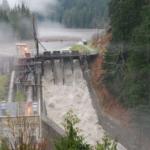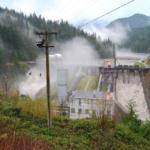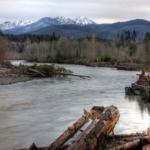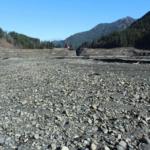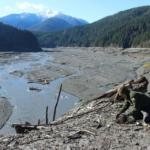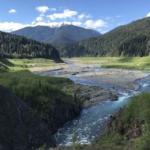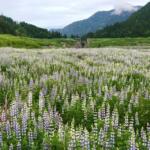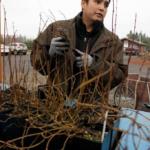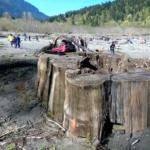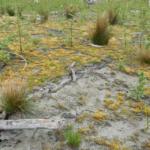When the last of two fish-blocking dams were removed as part of Elwha River Restoration efforts, it exposed more than 200 acres of prime floodplain habitat. Floodplains are critical parts of healthy rivers. Adequate floodplains allow rivers the room needed to expand and expend energy, particularly during high flows . This helps reduce flood risk. It also reduces the chance of salmon eggs known as redds, being scoured by high flows. Floodplain and side channels give salmon needed areas to feed, rest and escape during winter storms and other high flow periods.
Following dam removal, this newly exposed floodplain looked much like a barren moonscape. Significant amount of revegetation to restore these areas was needed. While significant federal resources were dedicated to Olympic National Park’s dam removal project in partnership with the Elwha Klallam Tribe, there was not funding for revegetation and other needed restoration. The Elwha Klallam Tribe, with Olympic National Park as an active partner; applied to the Lead Entity grant round in 2006 for funding to revegetate newly exposed floodplains. Revegetation limits erosion and ensures native plant growth, rather than having this critical area taken over by non-native plants and noxious weeds.
The Lead Entity submitted this project, along with two others; in the first Large Capital Grant round for state Puget Sound Acquisition and Restoration dollars. The project successfully competed against almost 45 other projects from throughout Puget Sound and was ranked high enough to receive funding. North Olympic was one of only two Puget Sound Lead Entities to have two projects selected for funding (the other being the West Sound Watershed Council in West Kitsap County).
The legislature dedicated significant funding toward PSAR Large Capital Funding in 2007 (the likes of which has not been seen since), allowing the Tribe and the Park to work together in subsequent years on a massive replanting of these key floodplain areas with native species. This successful revegetation effort helps guarantee floodplain health, and reduces soil erosion, which keeps additional sediment from the river. Crews from the Elwha Klallam Tribe, Olympic National Park, the Washington Conservation Corps and area citizens all played a role in replanting. Olympic National Park grew many of the plants needed for revegetation in a house which was removed from Dungeness River Floodplain as part of the River’s End restoration effort. Both Elwha and Dungeness Chinook must be recovered to remove Puget Sound Chinook from Endangered Species listing.


